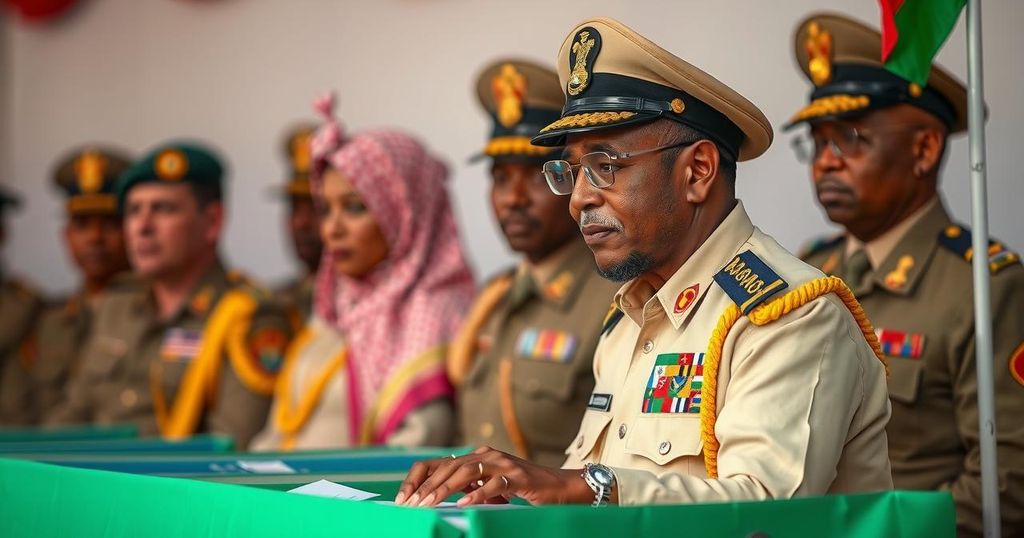Chad Votes in General Election Amidst Low Turnout and Opposition Boycott
Chad conducted a general election on Sunday, promoted by the government as a step toward ending military rule. The opposition’s boycott resulted in a low voter turnout of 38%, with many citizens expressing skepticism about the election’s integrity. While President Deby urged participation, reports indicated significant voter apathy and concerns over electoral fraud. The elections occur against a backdrop of regional instability and ongoing security threats.
On Sunday, Chad held a general election that the government claims is a critical step toward ending military rule, despite predictions of low voter turnout due to an opposition boycott. By midday, the election management agency, ANGE, reported a turnout of merely 38% for selecting a new parliament, provincial assemblies, and local councils. While government officials cited cold weather as a reason for the apathy, opposition leaders argued that their calls for a boycott were heeded by the majority of voters, with Succes Masra of the Transformers party asserting, “They have all stayed at home following our call, that is, the overwhelming majority.”
The absence of significant voter participation may favor candidates supportive of President Mahamat Idriss Deby Itno, who assumed power through military means in 2021 and subsequently was elected in a contest in May deemed fraudulent by opposition factions. President Deby encouraged citizens to vote, branding the day a historic occasion and posting his ballot-casting on social media.
Chad witnessed the voting of soldiers, police officers, and nomadic populations on Saturday, prior to election day, due to logistical considerations. Herve Natouingan, a local worker, expressed skepticism about the election, deeming participation futile due to a perceived lack of genuine voting. In contrast, Patrice Lumumba Deoumoundou, an unemployed individual, articulated hopes for change, citing a need for jobs, justice, and equality.
The challenges facing the voters, including climate change’s detrimental effects on nomadic communities, underscore the importance of these elections. Sheikh Djibrine Hassabakarim emphasized local stakes, conveying the community’s demands for improved living conditions. Despite the government claiming record turnout among military and nomadic populations, the opposition raised alarms about disappearing ballots and fraud attempts.
This electoral process occurs amidst ongoing violence from Boko Haram in the Lake Chad region and the fallout from a military accord with France, along with allegations of interference in Sudan. The government has characterized the elections as a pivotal step in transitioning to democracy, following the death of Deby’s father, who ruled for three decades.
The article discusses the recent general election in Chad, which is presented as a crucial step toward the restoration of democratic governance after three years of military rule. Following the death of former President Idriss Deby, his son, Mahamat Idriss Deby Itno, took control, leading to significant political unrest and opposition movements calling for a boycott of the elections. With a landscape rife with challenges such as economic hardships and security threats posed by extremist groups, the atmosphere surrounding the elections is tense and contentious. As the government seeks to legitimize its power through democratic processes, skepticism among citizens reflects broader concerns about the authenticity and integrity of the electoral system in Chad.
In conclusion, the general election in Chad symbolizes a potentially significant transition from military to democratic rule. However, widespread boycott calls from opposition parties, coupled with prevailing voter apathy and skepticism, raise questions about the legitimacy of the electoral outcomes. While President Deby promotes the elections as a landmark event critical for national progress, the realities on the ground suggest a complex landscape where genuine democratic engagement is challenged. Moving forward, it remains to be seen how these elections will impact Chad’s political future and the civilian population’s aspirations for stability and reform.
Original Source: www.hudsonvalley360.com




Post Comment